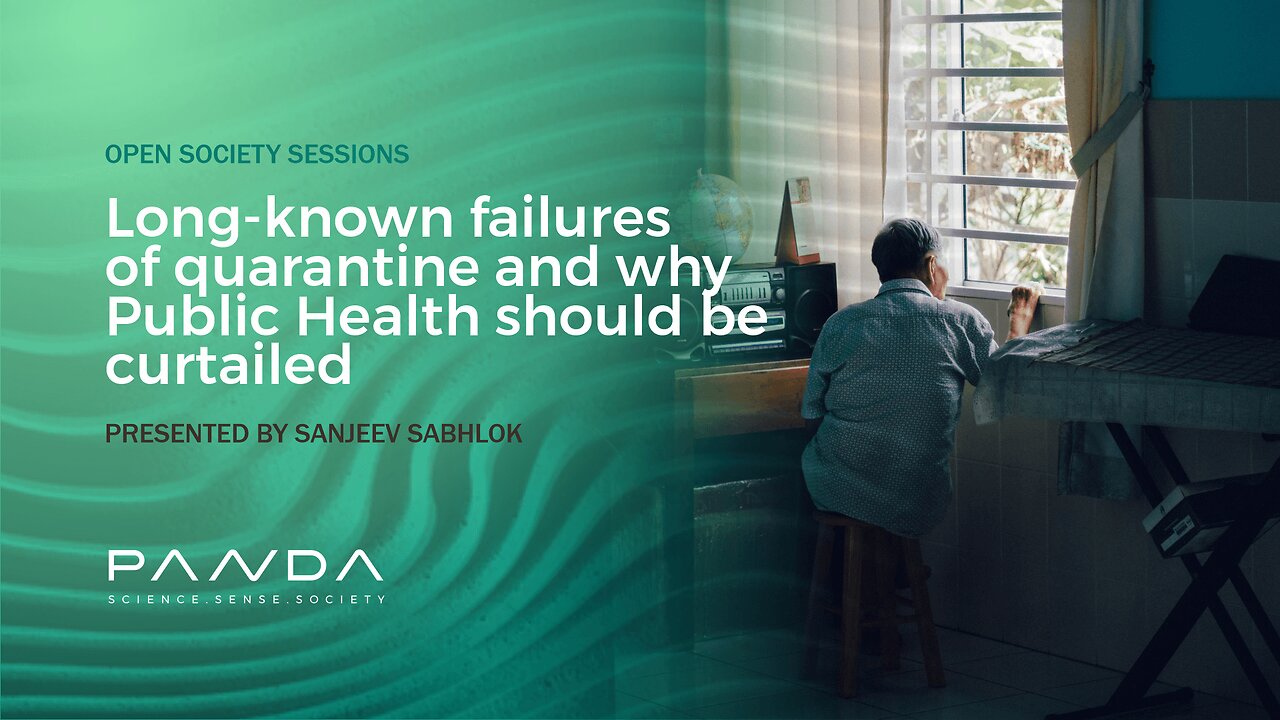Premium Only Content

Long-known failures of quarantine and why Public Health should be curtailed | Sanjeev Sabhlok
#publichealth #society #review
Sanjeev Sabhlok is a former economist from the Treasury Department in Victoria, Australia. He resigned in September 2020 to protest the police state created in Victoria by Governor Dan Andrews through his extreme lockdowns and mask mandates.
Sanjeev is author of a 2020 book "The Great Hysteria and The Broken State" and has supported Prof. Gigi Foster in a cost-benefit analysis (CBA) of Australia's lockdowns. The CBA was published in 2022 as a book "Do lockdowns and border closures serve the 'greater good'?"
Sanjeev realized that the scope of modern public health is not supported by the information constraints and incentives it faces. He therefore commenced a first-principles review of public health to determine its justified scope and powers. In this presentation, Sanjeev outlines the current status of his review.
Over recent months, he has published some of his findings in his Times of India (https://timesofindia.indiatimes.com/blogs/author/sanjeevsabhlok/ ) blog. For example, Dr Charles Maclean's scientific work which underpinned the Sanitary Movement of the mid-19th century that empirically demonstrate why quarantines have never worked and argue for their abolition. His work included a cost-benefit analysis of quarantines, and an examination of excess deaths from the plague quarantines (lockdowns).
Modern public health has reverted to the pre-Maclean era in which the scientific method is not applied. Instead, it bases its prescriptions for quarantine (lockdowns) on models and “ethical” considerations, without any regard for empirical evidence. It has effectively "cancelled" and blanked out both Maclean and his sophisticated research methods, since their existence poses an embarrassment to its practitioners.
Based on his preliminary findings, Sanjeev argues for the abolition and restructuring of most functions of public health.
The Covid event has revealed that it was about more than just public health and the political, economic and societal aspects of the response are of far greater significance than the virus itself. There remains a continued drive toward the transformation of our societies in ways that threaten democracy and our existing ways of life. Open Society Sessions aim to examine the political, societal and economic dimensions of our recent experience and analyse developments in the future.
Support our work: https://www.pandata.org/donate
-
 38:55
38:55
PANDA | Science. Sense. Society.
8 months agoTransgender Ideology and Ideation and the Impact on Children | Keith Jordan
1.37K1 -
 1:43:40
1:43:40
Badlands Media
12 hours agoBaseless Conspiracies Ep. 142: Doxxing the Deep State with Nick Noe - Part 3
79.2K18 -
 2:04:08
2:04:08
Inverted World Live
6 hours agoTop Secret Area 51 Project Spawns 'Invisible Enemy' | Ep. 77
57.5K9 -
 2:51:11
2:51:11
TimcastIRL
7 hours agoUNHINGED Liberals PROTEST Colbert Cancellation In NYC, Propaganda Machine IS COOKED | Timcast IRL
191K84 -
 2:42:48
2:42:48
The Quartering
6 hours agoToday's News Chat & Act 2 Of Expedition 33
70.3K4 -
 7:42:53
7:42:53
SpartakusLIVE
8 hours agoMonday MOTIVATION || Games w/ the BOYS into the NIGHT
63.1K -
 3:16:02
3:16:02
Barry Cunningham
7 hours agoNEWS ON THE PLOT AGAINST THE PRESIDENT AND IT'S A MOVIE NIGHT!
95.5K57 -
 2:00:32
2:00:32
Glenn Greenwald
10 hours agoWorld Finally Horrified by Israel's Atrocities in Gaza; Mass Starvation Expert Warns of Spiraling Crisis in Gaza; AOC Votes to Fund Israel's Iron Dome | SYSTEM UPDATE #489
99.4K139 -
 LIVE
LIVE
Spartan
7 hours agoSpartan - Pro Halo Player for OMiT | Scrims vs OMiT Black
538 watching -
 2:47:11
2:47:11
crgoodw1n
6 hours agoMonday stream Pt.2! Max Traders are almost here!
26.2K1